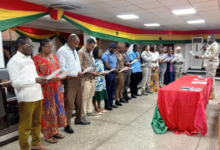
Ghana is capable of producing activated carbons or activated charcoal (ACs), using home-made materials to boost the gold and oil industries and the economy at large, Professor William Kwame Buah, Dean of the School of Postgraduate Studies of the University of Mines and Technology (UMaT), has said.
This, he said, was because the country had acquired a new reactor that has the capacity to produce ACs for large production and estimated that about 4.5 per cent of 1.6 million tonnes of fresh palm fruits bunches, constituting the kernel shell were produced annually in Ghana.
“Indeed, commercialisation of activated carbons production is highly recommend, because it would provide the AC needs of the country, provide employment, reduce foreign exchange on importation of the product, provide a boost for the gold and oil industry and improve management of biomass waste,” he stressed.
Prof Buah said these at an inaugural lecture on the topic, “The production of activate carbons from biomass waste in Ghana -A boost for gold and oil industries” at the university here last Friday.
Activated carbons are porous carbon materials that show strong sorption properties both from gaseous and liquid phases and could be produced from important materials including coal, coconut shells, palm kernel shells, coconut husks and corn cobs.
According to him, Ghana had the potential to reduce imports on activated carbons and produce them for local gold production, the water and the beverage industry and reduce odour, stressing “we can create wealth with this valuable resource”.
In Ghana, Prof Buah said, key materials which could aid in producing the activated carbons were regarded as waste and virtually did not undergo any value addition (wealth creation) or treatment, and believed that biomass wastes were critical avenues for wealth creation in the country.
He said research had proven that, Refuse Derived Fuel (RDF), converted into char, resulted in the production of activated carbons for gold absorption from gold chloride solution, stressing that the re-engineering of the hardened RDF-AC could make “it a valuable resource to the gold industry”.
FROM CLEMENT ADZEI BOYE, TARKWA







